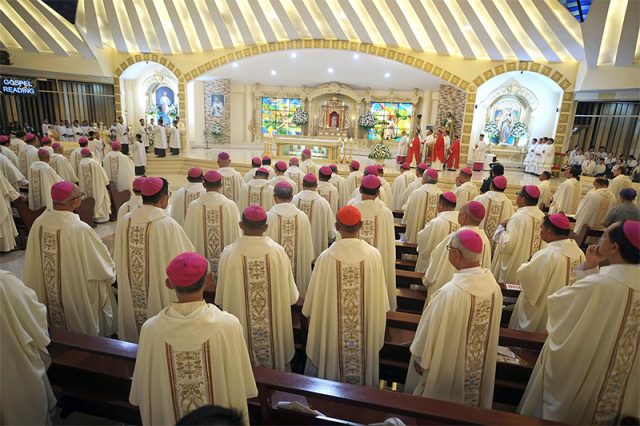
A Nation Founded on Family, A Family Founded on Marriage
“What God has joined together, let no one separate”(Mt 19:6). The Catholic Church has not given up on this teaching of Jesus, even in countries where civil divorce is already legal (see the Catechism of the Catholic Church 2384-2385). Therefore, even in countries where civil divorce is legal, Catholics still cannot simply get remarried in Church unless they file for a declaration of nullity of their previous bond of marriage — which is not the same as divorce. Precisely because we believe in the sanctity of marriage, we also believe that not all couples who are married have been “joined together by God”. We can apply this on marriage nullity and re-state the same Gospel passage in the reverse: “What God has not joined together, human beings can separate.”
We are indeed the last country in the world that has not yet legalized civil divorce. Should we therefore join the bandwagon? Of course we can, if we want to. Despite what religionists might think, we do have religious freedom in this country, and we uphold the principle of separation of Church and State. The Church is in no position to dictate on the State what is best for Filipino families. We know that our stubborn assertion that a genuine marriage cannot be dissolved, is not necessarily shared by all religions; and we respect that. But before we join the bandwagon, shouldn’t we ask ourselves on the basis of research and statistics, if the legalization of divorce all over the world has indeed helped in protecting the common good and the welfare of the family?
The Tagalog expression “maghunosdili muna tayo at mag-isip-isip” (Let’s keep our cool and ask ourselves) is probably the most appropriate exhortation to those who are too eager to come up with an Absolute Divorce Law in our country. Do we really want it for ourselves? Do we really want to make it easy for civilly-married couples to have their marriages civilly dissolved when they “want out” already, or when they don’t “feel like it” anymore?
Think about the many times your parents had gotten into each other’s nerves and were almost tempted to call it quits. Think about the number of times your father slept “outside the kulambo” or your mother packed up her things and brought you with her to her parents’ home, because of a misunderstanding between the two of them. Think about what could have long happened to your own family if civil divorce had already been available when you were much younger, and your parents were going through some serious problems in their relationship? Think of the sufferings that you would have had to endure if civil divorce had already been available as a remedy for what your own parents may have thought back then were “irreconcilable differences” between them?
While it is true that some marriages might indeed be beyond repair already, isn’t it just as true that going through times of marital crisis is almost a normal thing for all married couples and need not end too quickly in a parting of ways? Shouldn’t we also listen to the stories of couples that have crises related to their marital relationship and, after many years have looked back, realized that their bond had not been shattered? That it had actually been strengthened by the crises?
Statistics tell us that in countries where civil divorce is legal, “failure rate for first marriage is roughly 48%, 60% for second and 70% for third marriages” (National Center for Health Statistics). Are we sure we want our families to become part of this grim statistics?
We therefore appreciate it that our lay ecclesial movements, especially our family-oriented organizations, are now taking the lead in the debates on the advantages and disadvantages of legalizing civil divorce in our country. It is they who spare us bishops and priests of “ad hominem” arguments and having to answer painful questions like, “What right do you have to set the rules for marriage when you yourselves have opted for the celibate life?”
That is indeed a valid question. But no, we don’t intend to set the rules on civil marriage. We know that we are in no position to do that in the first place. We respect the legislative bodies of our country and the duty of our honorable legislators to come up with just laws that truly serve the common good. We can only hope and pray that they consider the gravity of the task entrusted to them and the need to engage the citizens in serious conversations about the implications of the laws they make.
As spiritual and moral leaders of the Church, we can only propose but never impose. We can only motivate our faithful to actively participate in reasoned public discourse as citizens. And so before we jump into the divorce bandwagon, before we end up regretting it and hearing those who dared to swim against the current, “But we told you so!” can we just take a little more time and ask — could there be a reason why we are practically the last remaining country in the world that still has not opted to legalize civil divorce?
No matter if our families are not perfect, perhaps we should be proud of the strong witnessing value of having a provision in our Philippine Constitution that says, “The State recognizes the Filipino family as the foundation of the nation. Accordingly, it shall strengthen its solidarity and actively promote its total development” (Art XV, Section 1). Could there be any other nation in the world that declares in its Constitution that the family is the foundation of the nation, and that “marriage, as an inviolable social institution, is the foundation of the family and shall be protected by the State”? (Art. XV, Section 2)
It is not true that there are no existing legal remedies within our present circumstances for marriages in crisis. Should not both institutions of Church and State explore more effective ways of maximizing these remedies without “throwing away the baby along with the bath water?” The absence of a legal civil divorce remedy should in fact be an additional reason for couples to think twice or thrice before entering into a civilly-binding marital commitment, precisely because of the value we put on the family as the foundation
of society.
As we discern together, perhaps we can reflect on the thoughts of Pope Francis in his pastoral exhortation, “Amoris Laetitia”, which is addressed mainly to Catholics living in countries with civil divorce laws: “Helping heal the wounds of parents and supporting them spiritually is also beneficial for children, who need the familiar face of the Church to see them through this traumatic experience. Divorce is evil and the increasing number of divorces is very troubling. Hence, our most important pastoral task with regard to families is to strengthen their love, helping to heal wounds and working to prevent the spread of this drama of our times” (Amoris Laetitia 246).
For the Catholic Bishops’ Conference of the Philippines,+ PABLO VIRGILIO S. DAVID, D.D.
Bishop of Kalookan
CBCP President
July 11, 2024









